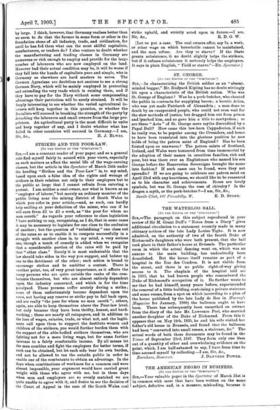ST. GEORGE.
[To THE EDITOR OF THE "SPErrTATOR."] SIR,—In characterising the British soldier as an " absent- minded beggar," Mr. Rudyard Kipling has no doubt wittingly hit upon a characteristic of the British nation. Who was St. George of England ? Was he a pork-butcher, who cheated the public in contracts for supplying bacon ; a heretic Arian, who was yet made Patriarch of Alexandria ; a man done to death by an exasperated people, who could not even wait for the slow methods of justice, but dragged him out from prison and lynched him, and so gave him a title to martyrdom ; or are these " Acta " of St. George mere myths discredited by a Papal Bull? How came this low-born Cappadocian, if such he really was, to be popular among the Crusaders, and hence to have been translated into the glorious position he now holds of being the patron saint of England P Has he been foisted upon us unawares ? The patron saints of Scotland, Ireland, and Wales were honoured from time immemorial by the adoption of their names in countless families, rich and poor, but was there ever an Englishman who named his son George before the Hanoverian Sovereigns brought the name into fashion P If such cases can be found, were they not sporadic? If we are going to celebrate our patron saint on April 23rd with any heartiness, we should like to be reassured as to his character and achievements. Roses are lovely symbols, but was St. George the rose of chivalry P Is the dragon a myth, or the pork-butcher P—I am, Sir, &c., Savile Club, 107 Piccculilly, W. E. D. STONE.






































 Previous page
Previous page